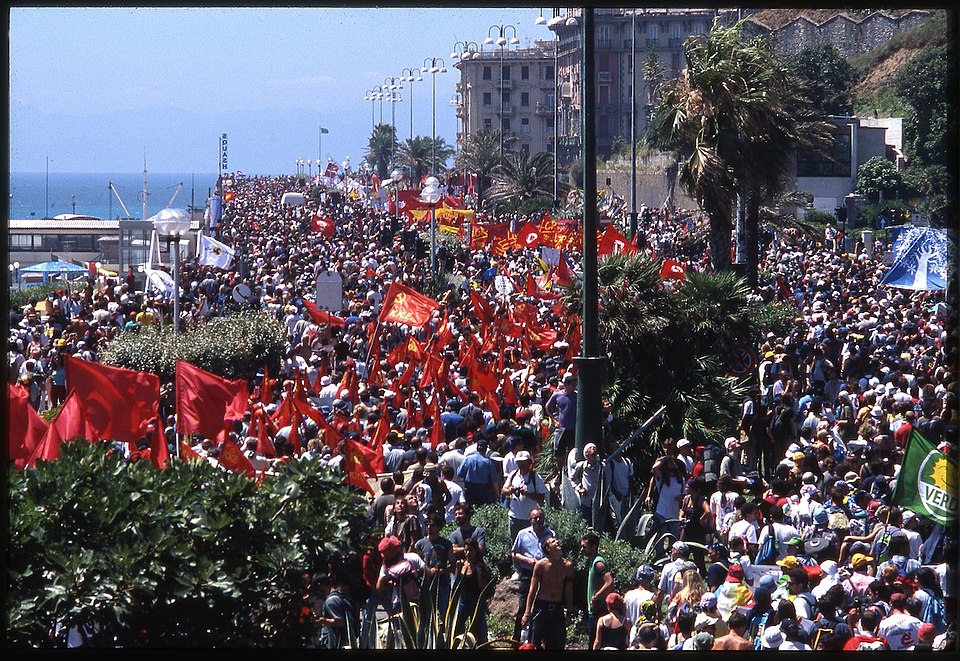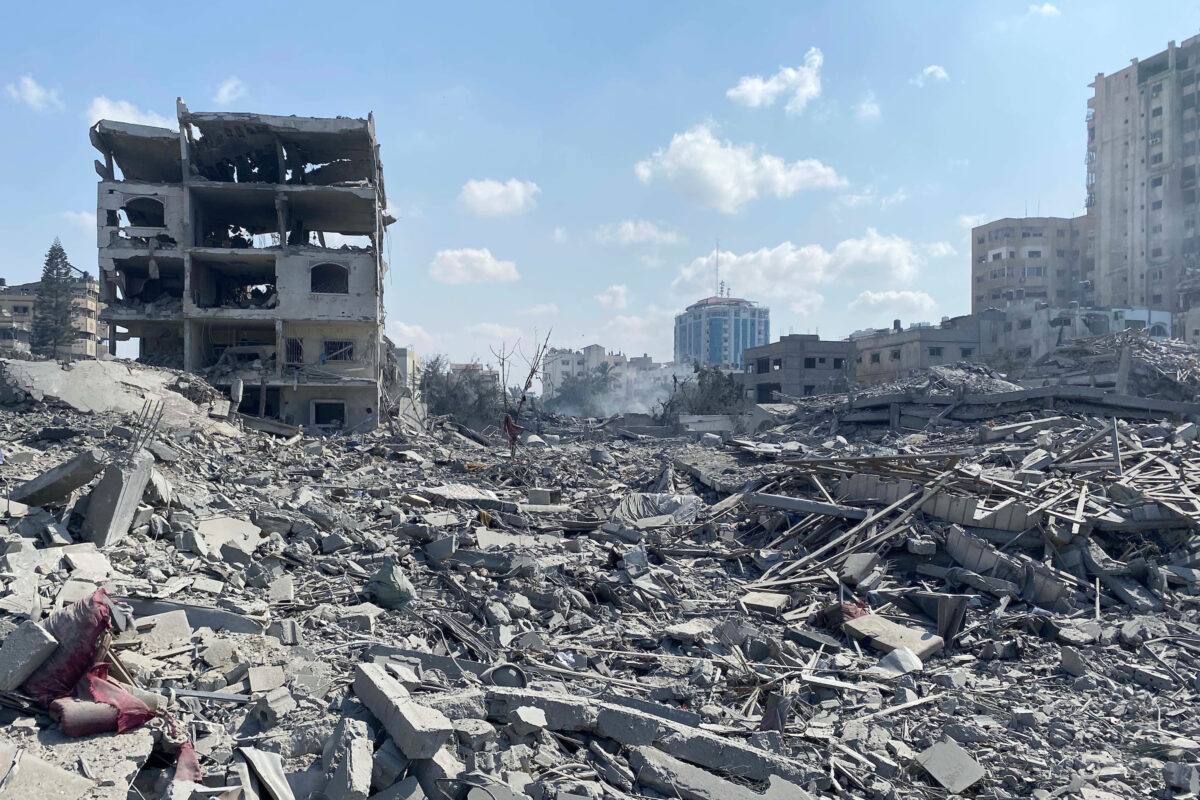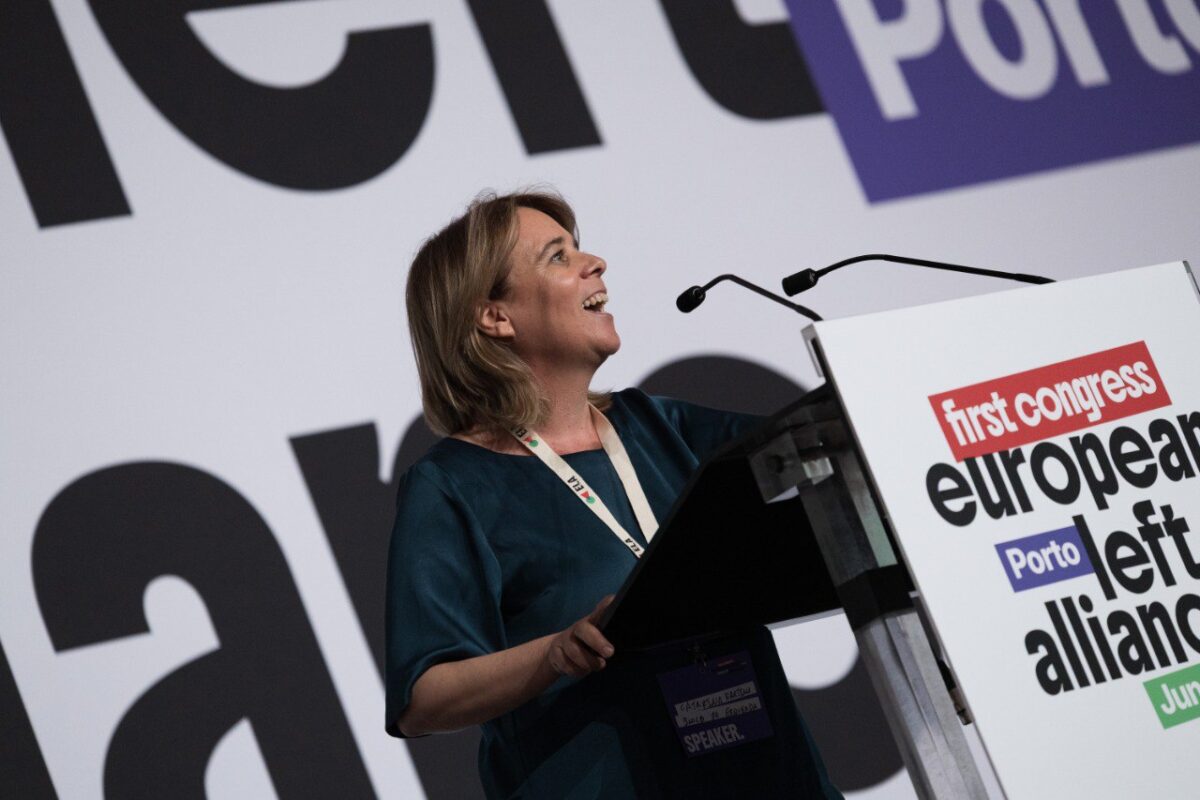Hi Catarina, thank you for talking to us. Let’s start by telling our readers about yourself and your background.
Hi, very pleased to talk to you. I was the national coordinator of Bloco de Esquerda (Left Bloc) for about 11 years—from 2012 to 2023—and I was also a Portuguese Member of Parliament from 2009 to 2023. My professional background is in theatre—I directed for theatre, and I was also an actress. I started to work with Bloco because I was an activist for precarious workers in the culture sector, but also for culture itself—for its presence in our democracy and in our lives. I’ve also done some work with poverty and with people who were excluded from everything—that’s where I met most people from Bloco. I was elected as an independent candidate, and later, I decided to officially join Bloco de Esquerda. After I left the party’s leadership in 2023, we had a discussion and felt that I should run for the European Parliament. I was elected an MEP (Member of European Parliament) in 2024.
People are often quite distant from European parliamentary politics. Can you briefly explain what the difference between a European political party (or Europarty) and a European political group is? What distinguishes them in terms of their purpose and how they act?
This is very important because I’ve read all sorts of things—that we are splitting from The Left, which is our parliamentary group. This is not the case. In the European Parliament, there are parliamentary groups; the one Bloco de Esquerda inserted itself into was called GUE/NGL (European United Left/Nordic Green Left). It’s now called The Left, but it’s stayed the same since the beginning. We are very happy there. This parliamentary group has different lefts, but we work together, despite not agreeing on everything. We are a confederal group, meaning we don’t all vote the same way on everything, but we have common principles. I don’t think the left can afford to not work together.
Within GUE/NGL, there were always different groups—parties that were in a European party, parties that weren’t; and we also had subgroups, like the Nordics—so it’s a group of different lefts. It has two parties from Portugal: Bloco de Esquerda and the Portuguese Communist Party. Within the European Union, for some parliamentary groups, their party and their parliamentary group are the same, which isn’t the case for others. For us, it was never the same. So what we formed was not a new parliamentary group, but a new European party.
You are one of the co-chairs, alongside Malin Björk, of the European Left Alliance for the People and the Planet—ELA for short—that was founded in August 2024, after the last European elections. What is ELA?
In 2018, Bloco de Esquerda formed a political platform with Podemos and La France insoumise, called Now the People (NTP), because we didn’t feel represented by the European party we were in. In NTP, we have always considered that struggles for workers’ rights, for an alternative to capitalism, for public services, for the public control of infrastructure and so on, have to be done at the same time, and with a clear environmental agenda. We don’t feel that this is a contradiction—in fact, we feel that one agenda makes the other stronger, alongside a feminist and antiracist agenda. When we fight capitalism, we fight patriarchy and we fight racism and colonialism. For these parties, it was always important to have political platforms with this kind of approach, and we didn’t have that in the European Left. At first, we tried for the European Left to be the house for everyone, to make it so that Podemos and La France insoumise and the Nordics could feel welcomed, but that was not possible—the European Left was never interested in that path. So, over time, we started to work on that platform (NTP), and ELA is the result of that long political process.
Why is it the case that it wasn’t possible to accommodate Podemos and La France insoumise? One possible comment is that this is splitting the left more.
We are not splitting, because we are in the same parliamentary group. We are creating a new way to articulate our struggles. The European Left always had an approach of trying to have common political declarations, even when the national circumstances did not allow for it. What we need to understand is that the left forces in Europe don’t always need to have the same propositions. Sometimes, what a national circumstance or a geographical one demands is different. I’m happy that Podemos is an ELA founder, but EH Bildu is also a member. We are proving that we can have different parties, even when they “compete” in the same elections, so to speak.
We needed a practical element of articulating struggles and learning. I believe that ELA has a concrete, practical approach to how we can learn from each other. Our discussions are a lot about the kinds of tools we can use and what campaigns can bring us together, rather than debates. While debates are interesting and the left should have them, we cannot let them paralyse us. Sometimes we felt that the European Left was quite paralysed by that and lacked this practical approach. For us, a European party should mainly make us articulate concrete steps, learn from each other, be a tool for common struggles and help each other, rather than a space that tries to define the political path of each national party. We need to have the tools to think together, which is why we decided to create a think tank. A European party is not a national party; it should not do the same as a national party does.
Another difference is that ELA only allows parties with seats in a national parliament or with elected European deputies to be members. That is different from the European Left, whose membership is open to any left parties, even if they don’t stand in elections, as well as individuals. Is there a reason why ELA chose this membership framework?
It’s important that the parties that are in ELA are parties that want to dispute elections, and that have a responsibility towards how they present themselves to the people. We don’t want to risk becoming a very closed field of thought that doesn’t enter into dialogue with the people. If one party loses representation, it doesn’t have to leave ELA—we have a buffer, so they are still a part and have all their rights. However, for the kind of party we are creating, the responsibility of disputing social relevance and political relevance in the institutions was important.
ELA held its first Congress last month, in Porto, on 13 and 14 June, under the motto “for a stronger left against the far right”. What are your highlights from that? What were the major decisions and orientations adopted?
We know that the far right is quite organised and articulated—also because they have funding from oligarchs. We should also be well articulated, and learn from each other how best to campaign andto use all the tools at our disposal. Part of the decisions we took was to have a working programme that allows us to have precisely that kind of change of ideas on a very concrete level.
The other thing we decided on was to create a think tank because we also need that kind of reflection; it’s also to collect data, to conduct more research. Not only to debate the big questions that the left has today, but also to know more about what is going on, and what the debates happening in each country are, because we are in a situation where the far right determines the terms of the debate, and we need to change that. That is our main goal with ELA: to change the political agenda. We cannot always be discussing the far-right agenda; we need to have a cultural battle, to make debates on left terms. Collecting data is an important part of it.
We have also decided on our first campaign together, which will be to collect one million signatures for a European Citizens’ Initiative (ECI), which states that the European Union cannot have any commercial or association agreements with a country that violates international law. That means we want sanctions on Israel, and we want the end of the association agreement. I think it’s important that we do this because while the EU is evaluating the association agreement with Israel, it doesn’t mean anything—the agreement should not exist in the first place, because Israel has never complied with international law. That the agreement persists when we have a genocide is something we cannot understand, so this is taking the voice of the people to the institutions. At the same time, it’s a concrete way for the parties to work together and put all those practical tools and learnings to use on the ground.
That is very important. In the last year and a half, we have witnessed massive mobilisation all over the world, condemning Israel’s government actions, including people in Europe pressuring their governments and demanding an end to their complicity. However, we failed to stop the genocide. It seems that governments no longer seem to care about public support, or they don’t need public support to continue doing what they’ve been doing. So what can we do?
That is why we have chosen this. The parties of ELA, despite having different positions on some decisions, all agree that it’s only natural that the European Union has sanctions on Russia, because Russia invaded Ukraine. So how can we explain that we have an association agreement with Israel? It’s not acceptable. Different international studies show that public opinion reflects widespread shock at what is going on, and wants to end the genocide and wants sanctions to Israel. Something central in our programme and the Congress was the idea: “from the streets to the Parliament”. That’s what we do, that’s what the left needs to do. This European Citizens’ Initiative is that: we want the voices of the streets in the European institutions. We are convinced that there’s a broad majority of the European people who understand that the EU, being one of the major partners of Israel, actually has the power to stop the genocide, if it imposes sanctions.
On ELA’s political platform, feminism is one of the main pillars. We have seen feminism being misused and even co-opted for neoliberal gains in different areas. One example would be Annalena Baerbock, Germany’s Foreign Minister, who is associated with a so-called feminist foreign policy, while defending Israel’s killings of Palestinian civilians. What does it mean to have a left, feminist european programme?
For us, fighting capitalism comes along with fighting patriarchy, we need to do it together. Feminism is key in fighting the far right because it has to do with equality, with respect for everyone, and with carework. Feminism is crucial in imagining other futures: imagining an alternative world from this neoliberal world, from its hatred and war. Feminism is not only about individual rights; it’s about forging an alternate society.
In terms of popular participation, Italy recently had a referendum, which included a question on easing citizenship requirements for migrants; however, it failed since only 30% of eligible people voted, and a third of them voted against making citizenship more accessible. How do we build support and solidarity with migrant workers when citizens seem so happy to sacrifice them?
We have never produced as much as we produce now, and in the last 25 years, we have had a huge change in our technological competence. However, in this century, innovation is not social progress—on the contrary. For many years, innovation marginally served the workers, even if it was not well distributed. But now, it’s against the workers. People feel that their lives are getting worse, there are impossible rhythms of work, impossible working hours, the wages are not enough, and the new generations don’t think their lives can get better. That creates a lot of resentment, and the neoliberals and the far-right know how to use that resentment. In fact, it was not the far-right that started it, it was neoliberalism, and the far-right grows because of neoliberalism, and gives people a simple explanation: your salary is low because there’s an immigrant that is willing to work for a low salary, you don’t have a home because immigrants get available homes, and other things like that, which are not true. The left needs to be able to put the conversation in other terms and determine the debate in new ways, explaining that it’s not the immigrants who are taking jobs, but rather that we have never had as much inequality in the world as we have today. And we need to learn to say this in different ways. That’s why we want ELA to articulate concrete ways to do things.
At the same time, we need new ways of organising workers, that immigrant workers can be a part of. There’s a part of the left that sometimes seems to go along with the right-wing criticism of the left, saying that defending immigrants, or being antiracist, or being feminist, doesn’t help our struggle with workers. Is there any place or any activity where we can have workers’ struggles without women or without migrants? No, it’s impossible. We need other ways for people to feel represented, and that’s the work of the left, but not only of the left parties—this is also the work of the unions. We need to integrate migrant workers into the workers’ rights struggles in Europe. We have good examples of that, and we already know how to do it in some sectors. But it’s still too little, we need to do it better, and we need to do it all over.
The far right is growing in European countries. In some cases, the left is struggling, on one side, to keep parliamentary representation, and on the other, grassroots mobilisation; sometimes both. How can we regain ground?
We need both. We cannot give up on the institutions. We can say that the democracies that we have are quite limited—and they are—and they are not the democracies that we would stand for. But not using what we have is a silly mistake. When we see how fast Orbán dismantled the democratic rules in Hungary, when we see what Trump is doing, can we really leave the institutions up to them? I don’t think so. They are a tool and we need them. Of course, we also need to have grassroots movements, and we shouldn’t see them as opposites. We need to be everywhere. We are in a new, dangerous moment in our history, not only European but internationally, with fascism on the rise. Faced with that, the answer can’t be to be scared and run, but to foster the resistance. Grassroots movements don’t have to be instrumentalised for institutional activity, the same way that our institutional activity cannot be determined only by what the movements are saying at each time.
The left, being anticapitalist and progressive is under attack, because we represent everything that is under attack right now. Wanting an alternative to capitalism makes us the target for neoliberals, for the centre, for the far right. Stating that everyone is equal and that everyone needs to be free—at a point in time where fascism is on the rise, when you see how non-white, LGBTQIA+ people, and women are being targeted—the present moment is really important. We know that this anti-conservative and progressive agenda is key in fighting fascism. That is what mobilises people. I see the younger generation—where there’s a real polarisation—but we also have so many young people who understand this, and that gives us hope.
How can people get involved with ELA?
ELA is a party of parties, but we are trying to have initiatives and be open to discussions. We will have a youth camp in Poland at the beginning of September. In our Congress in Porto, it wasn’t only parties participating: we opened it up to social movements and to people from outside Europe. That gives us hope and energy. Lots of things can be created from that. So, for anyone interested, you are welcome to our initiatives.




